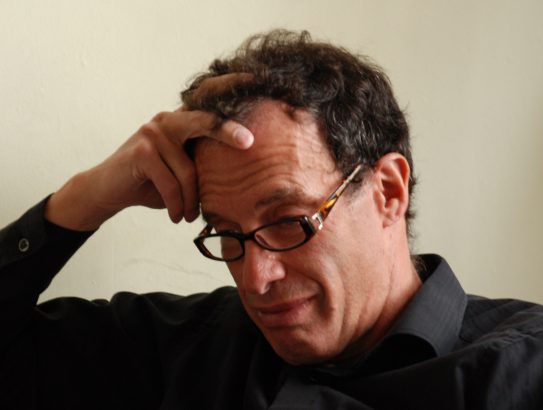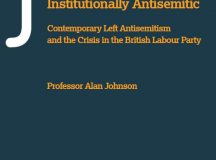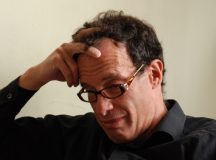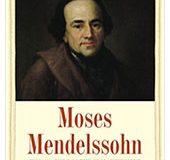The late writings of Robert Fine, who died in 2018, can help us understand the manifold connections between the Enlightenment roots and the contemporary forms of left antisemitism. He understood that a form of universalism that did not care for the particular, which indeed made the particular its inimical ‘other’, was fatally flawed. What was needed, he thought, and more than ever after the Holocaust, was a form of universalism that cared for the particular as well as the general, which included Jews and recognised the acute trauma they had experienced, without ignoring but rather connecting them with the sufferings of so many others in what remains a profoundly flawed world. Philip Spencer, with whom Robert co-wrote his final book, explores his legacy.
Some two years ago the left lost, in Robert Fine, one of its most valuable resources for thinking about the growing threat of a resurgent antisemitism, not least from a section of its own radical wing. Robert came relatively late to this question, having built a significant reputation over a number of decades as a social theorist with a wide range of interests: from apartheid South Africa to the importance of the rule of law (especially for the left); to the continuing relevance of Hegel and Marx, and the insights of two major twentieth century thinkers in particular, Hannah Arendt and Jurgen Habermas; and the need today for a cosmopolitan response to the threat of a resurgent nationalism.
There were links of course between these interests, which were grounded in his commitment to a set of values which had initially pushed him to adopt a particular form of Trotskyism, one which (like Trotsky himself in his later years) had come to understand that antisemitism was a problem which the radical left needed to take much more seriously.[i] Although he did not remain a member of the particular Trotskyist organisation he joined,[ii] he maintained links to it and never thought of his original commitments as a youthful mistake. Rather, he thought that the values that Trotskyism had originally embodied had been renounced by too many on the radical left, to its shame and to its cost.
Robert’s mounting concern with the antisemitism which has overtaken so much of the self-proclaimed radical left in recent years (exemplified but not confined to what went on in the Labour Party in the UK once Jeremy Corbyn was elected leader in 2015) was grounded in those values. Robert had not anticipated this noxious development, too confidently assuming perhaps (like many of us, including this author) that after the Holocaust, antisemitism was a thing of the past, confined at worst to the far-right margins of the political world. When antisemitism re-emerged as a problem not only on the right but also on the radical left, Robert was alarmed by the refusal of so many to admit there was a problem at all, and by the way in which they colluded with it, condoned it, and facilitated it.
The Enlightenment roots of left antisemitism
In order to understand this dismaying phenomenon, which (like all forms of antisemitism) combines both old and new elements, Robert was driven back to reconsider the strengths and weaknesses of the intellectual and political movement which we know as the Enlightenment, which took off in the 18th century, and from which the modern left emerged in the first place. Enlightenment thinkers shared a fundamental commitment to the use of reason rather than faith or tradition or simple prejudice as the basis for understanding the world and making it a better place for all its inhabitants. With respect to the position of Jews, however, Robert found a more complex and mixed picture than might be assumed. Drawing on some insights of Hannah Arendt, Robert argued that the Enlightenment’s universalist commitment to the rights of all human beings, which provided the ethical and political basis for Jewish emancipation in the modern world, was not understood in the same way by all. For some Enlightenment thinkers, Jewish emancipation had important conditions attached to it. They were conditions, moreover, which derived in a paradoxical way from the explanation they gave for the existence of antisemitism in the first place. Their effect, when they were applied, was to turn Jews into the other of their version of universalism.
Antisemitism, it was claimed, was understandable because Jews behaved badly, though not primarily at the time through any inherent fault of their own. That bad behavior was rather thought to be a result of their long-term exclusion from society and from the benefits of civilisation. Confined to the ghetto, Jews had (according to this way of thinking) persisted with their peculiarly retrograde religion, which (because it was supposedly only for the ‘Chosen People’) was not even as universalist as other derided monotheisms. Jews were said to have been forced to stick too closely to each other, to feel loyalty only to each other rather than to the wider society in which they lived (without rights). They felt (supposedly) sorry only for themselves, and were prone to exaggerate their misfortunes and ignore those of others, engaging in special pleading, and (because of the restrictions imposed upon them) had ended up participating in obnoxious and unproductive forms of economic activity such as usury. Once emancipated, it was assumed by those who promoted this ‘explanation’, this bad behavior would cease. Grateful for the emancipation generously bestowed upon them, Jews would (it was assumed) fully assimilate, mix freely with others, abandon their ‘tribal’ loyalty to their fellow Jews, leave aside their backward ways, norms and beliefs, and become honest and productive members of society. The problem with this line of argument was what would happen if (in the eyes of those who thought along these lines) Jews failed these tests. It might then be but a short step to the conclusion that Jews did indeed have no place in society and ought once again to be excluded.
But Robert always understood that antisemitism has never been about what Jews do or don’t do.[iii] It is about what antisemites imagine and project on to Jews, which they have done in different ways over the centuries. On the right, antisemitism could now be justified and to be encouraged because the emancipation of Jews was perceived as a threat to the existing order; and on the far right, to the re-establishment of some fantasy or other of that order. On the left, on the other hand, it turned out that antisemitism could be understood and even condoned because Jews (supposedly) continued to behave badly and had not fulfilled all the conditions set for them. Too many of them (supposedly) stuck too closely to each; they continued to feel committed to each other, not just to their fellow Jews inside one nation state or another but across its borders (since Jews lived in so many different parts of the world of the world); they continued to protest too much about their ill-treatment, prioritising this over what was happening to others and the interests of the wider society which had generously allowed them in. Within this framework, philosemitism indeed was seen as a much more serious problem than antisemitism because it only encouraged Jews. In the worst cases, because it was understandable, antisemitism might even be seen as a conduit to socialism itself, as people might begin by fighting Jewish capitalists and then want to fight all capitalists.
One might have thought that the Holocaust would have changed all this – but it didn’t. On closer examination, Robert came to see that antisemitism had never really been taken that seriously by many on the radical left, contrary to its self-image. Before and during the catastrophe, many repeatedly downplayed its significance. Afterwards, it was widely assumed that because Nazism had been defeated, and antisemitism only belonged on the right, antisemitism was a thing of the past, no longer significant or relevant. Even in the Holocaust, antisemitism was too often seen as only one factor among many, and not that important. What did continue to matter was racism more generally, of which antisemitism was seen to be a relatively minor and decreasingly significant element. As a form of racism, it had supposedly been replaced by other much more serious forms.
Robert challenged this dismissive view, but not by prioritising or separating antisemitism from other racisms. On the contrary, he insisted on the need to see both how antisemitism was connected to other forms of racism and also what was specific to it.[iv] He fought a long and difficult struggle to get the study of antisemitism to be taken seriously in his own field and was instrumental in forging a very important network of colleagues in the European Sociological Association to undertake this study.[v]
The study of antisemitism today is not, and could not be, a purely academic or ivory tower matter. What Robert discovered was that the resistance to taking antisemitism seriously he encountered in the academy is widespread on the radical left today for essentially the same reasons. It is grounded in the shared view that antisemitism is not a serious matter and that those who say that it is must be doing so for bad reasons and with ulterior and malign motives.
Contemporary left antisemitism
If the origin of this way of thinking could be traced back to the Enlightenment, it has now returned to plague the modern radical left, which has once again adopted a way of thinking about Jews that assumes that there is (once again) what he and I came together to identify as a ‘Jewish Question’ and which became the focus of his last book. It is not of course a real question at all but a way of thinking about Jews in the modern world which is inherently antisemitic, because it starts from the premise that Jews are a problem. It is not the same as earlier forms of antisemitism because it is located in the modern world, in which Jews have (unevenly, inconsistently and only conditionally) been emancipated, a modern world in which the Holocaust took place.
In the book we wrote together,[vi] we explored some of the ways in which the framework of a supposed Jewish Question is used once again to attack Jews for their supposedly continued bad and indeed worsening behaviour. Much of this attack today (though not all) has to do, he argued, not just with particular policies of the government of Israel but with its very existence, and the unwillingness to recognise why such a state came into being after the Holocaust. In turn, he noted how the memory of the Holocaust itself is too often abused to attack Jews who are said to exploit it for malign and self-interested purposes, once again willfully exaggerating the harms done to them at the expense of sympathy for and solidarity with the many other victims of racism.
The latter charge highlights what Robert (along with others) identified as a distinguishing feature of antisemitism on the radical left today, which is its selective anti-racism.[vii] This is not to be found on the right, which is the only kind of antisemitism much of today’s radical left seems willing to recognise. But he argued that this selective anti-racism has given antisemitism on the radical left both a particularly toxic charge and a deeply damaging opacity. The charge is that Jews have not learnt the universal lessons of the Holocaust themselves but have adopted the very racism of which they were themselves the victims. Thus, Israel is said to be an apartheid state, which is supposedly itself committing genocide against the Palestinians.[viii] The opacity comes in the way in which this selective anti-racism (selective because it adamantly refuses to recognise antisemitism as a significant form of racism) acts as a distorting shield. Precisely because this section of the left thinks it is anti-racist, it asserts that it cannot by definition be racist itself, thus closing off the discussion entirely. Given this self-belief, it is hard to see what evidence would make those who see themselves as pure and correct change their minds.
The adoption of this markedly self-righteous position by many (not all) on the left is seriously disfiguring and perverting both its politics and ethics. It is, however, not entirely new. There has long been a tradition on the radical left of identifying and excoriating anyone who questions a leadership which styles itself as both correct and pure, and sees enemies and conspiracies all around. This was particularly the case of course with Stalinism, which made its own contribution to the history of left antisemitism when it cast Jews as enemies of the people in the anti-Zionist campaign of the late 1940s and early 1950s. Robert saw this as in some ways an updated version of the exclusionary universalism whose roots he had identified in part of the Enlightenment. But he also saw that it was itself capable of further updating. Even though the Soviet Union was no more and (for the most part) no longer acted as immediate reference point or inspiration for many on the radical left, its crude and cynical anti-Zionism was a crucial building block in the contemporary reconstruction of the Jewish Question. In its latest version, Israel (as a tool of American and Western imperialism or vice versa) has become, in the eyes of many on the radical left, the number one enemy of the oppressed peoples of the world. Robert was sharply critical of the assumption many then made, that all those who fight against it (no matter how reactionary they might appear) are ipso facto inherently progressive.
This latter claim may be seen as an updated version of the notion, already circulating on the left in the Second International and promoted also by anarchists like Proudhon and Bakunin in the 19th century, and then picked up again by the Communists in the 1920s and 1930s, that antisemitism might be a gateway to socialism. In the late 19th century, the German Marxist leader August Bebel attacked this argument, describing antisemitism as the socialism of fools (although he did not actually invent this term and it probably concedes too much to its advocates, to the extent that it still uses the term socialism). More recently, Moishe Postone (a fellow thinker of Robert’s in many ways and whose almost simultaneous passing is also a great loss) called the updated version the anti-imperialism of fools.[ix]
What Postone and Robert both realised is that antisemitism always plays a key role in the perversion and distortion of socialism. Once socialists accept the premise that there is a Jewish Question, instead of focusing on antisemitism, they end up colluding with it, facilitating it and promoting it as part of (and in the worst cases the whole of) the explanation for all that has gone wrong.
Reading Marx’ ‘On the Jewish Question’
One of Robert’s most interesting arguments was to suggest that Marx himself never went down this route. In a number of thought-provoking articles, he looked closely at Marx’s famous (infamous to some) essay ‘On the Jewish Question’.[x] Whilst fully accepting that much of Marx’s language and mode of expression was thoroughly objectionable (though scarcely unusual at the time), he pointed out something that is rarely noticed. It is that Marx wrote these essays not as an exercise in antisemitism but as a response to an avowed antisemite, the radical left Hegelian Bruno Bauer. Robert located Bauer very much in the tradition of an exclusionary universalism, in arguing (as a radical of his time) that Jews had failed the emancipation test and had become the most dangerous enemies of progress. Marx, according to Robert, rejected Bauer’s entire argument, and most importantly insisted that there was no Jewish Question at all. For Marx, Jews were absolutely entitled to the same rights as everyone else. The key question was not what Jews did or did not do but what was going on in the wider society. Rather than Jews being the problem, it was society itself that was riddled with contradictions. The issue was not to single out and obsess about Jews but how to change the world in which antisemitism existed in the first place, and where it could be promoted by self-designated radicals as the solution to the world’s ills.
The importance of Robert’s rereading of Marx is that it directs our attention in turn to others on the left who, like him, also rejected the whole idea of a Jewish Question and who have seen antisemitism for what is really is – a major evil, what Max Horkheimer and Theodor Adorno (two of the most thoughtful Marxists of the 20th century) called a ‘central injustice’, above all in the Holocaust. Robert argued that there was a whole other tradition on the left which urgently needed to be revived today, one which took antisemitism very seriously. In some ways, this is his most important legacy, that he reminded us that we do not need to start from scratch in thinking about antisemitism. It has never has been the case, and need not be now, that the whole of the radical left is antisemitic. On the contrary, there is this whole other tradition to draw upon, to use and to develop, starting with Marx, going on to Trotsky and to Rosa Luxemburg;[xi] to less orthodox Marxists such as Horkheimer and Adorno; and (further out still on the edges of Marxism) to Hannah Arendt and Jurgen Habermas, both of whose reflections on antisemitism and the Holocaust Robert sought to develop.
Conclusion: rethinking universalism
What was of particular concern, Robert believed, to all these later thinkers, despite all their differences, was that they understood that antisemitism was a profound problem not only for Jews but also for humanity itself. For those thinkers who witnessed the Holocaust, the radicalisation of antisemitism into a genocidal ideology changed everything. It gravely imperiled both the particular group (Jews were now threatened with total destruction) and humanity as a whole. A form of universalism that did not care for the particular, which indeed made the particular its inimical other, was fatally flawed. What was needed, more than ever after the Holocaust, was a form of universalism that cared for the particular as well as the general, which included Jews and recognised the acute trauma they had experienced, without ignoring but rather connecting them with the sufferings of so many others in what remains a profoundly flawed world.
[i] See Alan Johnson’s carefully argued and well-document defence of Trotsky in this regard: https://fathomjournal.org/the-fathom-long-read-leon-trotskys-long-war-against-antisemitism/. Dismayingly, very few of his followers have taken seriously what Trotsky himself came to understand.
[ii] The Alliance for Workers Liberty, formerly known as Socialist Organiser. For some appreciation of his work from this quarter, see https://www.workersliberty.org/robertfine
[iii] David Seymour, one of his closest colleagues, remembers ‘one the very first things Robert told me: “If you want to know anything about Jews, don’t look to the antisemites!”’ See his ‘Conversations with Robert: “Jews as Jews” and the Critique of the Critique’, Journal of Contemporary Antisemitism, vol.2, no.1, 2019, p.73.
[iv] See his essay co-authored with Glynis Cousin, ‘Brothers in Misery: Reconnecting Sociologies of Racism and Antisemitism’ in Efraim Sicher, ed. Race, Colour, Identity: Rethinking discourses about ‘Jews’ in the 21st century, Oxford: Berghahn Books, 2013, 308–323.
[v] The network has been going now for over a decade. For one example of its work, see the collection edited by Robert and Christine Achinger, Antisemitism, Racism and Islamophobia: distorted faces of modernity, London: Routledge, 2017.
[vi] Robert Fine and Philip Spencer, Antisemitism and the Left: the return of the Jewish Question, Manchester: Manchester University Press, 2017.
[vii] See in particular David Hirsh’s Contemporary Left Antisemitism, London: Routledge, 2017. Hirsh penned a very moving tribute to Robert which can be found here: https://www.europeansociologist.org/issue-42-1968-50-years/memoriam-robert-fine-1945-2018
[viii] Alan Johnson has provided a thorough demolition of this charge, which can be found here: http://www.bicom.org.uk/wp-content/uploads/2014/02/BICOM_Apartheid-Smear_FINAL.pdf On some of the absurdities involved in the claim that Israel has committed genocide, see Philip Spencer, ‘The Left, Radical Antisemitism and the Problem of Genocide’, Journal for the Study of Antisemitism, 2010, in particular pp. 511-517.
[ix] See his seminal essay, ‘History and Helplessness: Mass Mobilization and Contemporary Forms of Anticapitalism’, Public Culture, vol 18, no.1, 2006.
[x] ‘An early version of this argument can be found in his ‘Rereading Marx on the ‘Jewish Question’ in Marcel Stoetzler, ed. Antisemitism and the Constitution of Sociology. Lincoln, NE and London: University of Nebraska Press, 2014, 137-159.
[xi] Although Luxemburg has been rightly criticised for her comment (at one moment in time), that there was nothing special about antisemitism, she clearly understood what Marx was doing in his response to Bauer, unlike the majority of her contemporaries who effectively misread him as agreeing (!) with Bauer. For a detailed exposition of this difference, see Lars Fischer’s brilliant analysis in The Socialist Response to Antisemitism in Imperial Germany, Cambridge: Cambridge University Press, 2007.






































